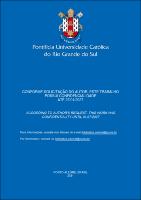| Share record |


|
Please use this identifier to cite or link to this item:
https://tede2.pucrs.br/tede2/handle/tede/10060Full metadata record
| DC Field | Value | Language |
|---|---|---|
| dc.creator | Pereira, Rafael Caselli | - |
| dc.creator.Lattes | http://lattes.cnpq.br/3975671448426828 | por |
| dc.contributor.advisor1 | Jobim, Marco Félix | - |
| dc.contributor.advisor1Lattes | http://lattes.cnpq.br/7781138223264118 | por |
| dc.date.accessioned | 2022-01-28T11:22:55Z | - |
| dc.date.issued | 2021-12-13 | - |
| dc.identifier.uri | http://tede2.pucrs.br/tede2/handle/tede/10060 | - |
| dc.description.resumo | O diálogo entre o civil law e o common law é fundamental para a efetivação da tutela dos direitos, por meio da influência e da adaptação (de acordo com a cultura e as particularidades de cada sistema) de métodos, institutos e técnicas. Sob a perspectiva do recurso especial, toda questão, seja de fato, seja de direito, tende a ser preponderante. A diferença que importa para a condição de admissibilidade e julgamento do mérito do recurso especial (e, portanto, não incidência da Súmula 07) é o quanto o elemento comum da incontrovérsia, seja a partir das hipóteses dos fatos que independem de prova (fatos puros), seja por meio da fixação dos fatos instrutórios (objeto de prova), estejam ilustrados na decisão recorrida. Independentemente do entendimento acerca do caráter vinculante ou persuasivo atribuído aos precedentes e às súmulas dos incisos I a V do art. 927 do CPC/2015, verifica-se ser possível que o fato incontroverso essencial ou relevante, puro ou instrutório, além da conclusão (consequência jurídica) não apenas influenciam, como sejam integrantes do fundamento determinante da decisão que forma o precedente. Os benefícios desse modo de compreensão do fenômeno seriam: a) uma forma de controlar os riscos da generalidade fática que ensejaria a aplicação equivocada do precedente; b) a facilidade de demonstrar a distinção da questão jurídica do seu caso em relação ao precedente, cuja aplicação equivocada poderá lhe trazer prejuízos; e, por fim, c) a contribuição para desenvolver a unidade do direito. | por |
| dc.description.abstract | The dialogue between civil law and common law is fundamental for the effective protection of rights, through the influence and adaptation (according to the culture and particularities of each system) of methods, institutes and techniques. From the perspective of the special resource, every question, whether in fact or in law, tends to be preponderant. The difference that matters for the condition of admissibility and judgment of the merits of the special appeal (and, therefore, non-incidence of precedent 7-STJ) is how much the common element of the uncontroversial, whether through the hypotheses of facts that do not depend on evidence (pure facts), or by fixing the instructive facts (object of evidence), are illustrated in the appealed decision. Regardless of the understanding of the binding or persuasive character attributed to the precedents and summary statements of items I to V of art. 927 of CPC/2015, it is possible that the essential or relevant uncontroversial fact, pure or instructive, in addition to the conclusion (legal consequence) not only influence, but be an integral part of the determining basis of the decision that forms the precedent. The benefits of such a measure would be: a) a form of controlling the risks of factual generality that would give rise to the mistaken application of the precedent; b) facilitate the demonstration of the distinghishing of the legal issue of its case in relation to the precedent whose mistaken application could bring it harm; and, finally, c) contribute to the development of the unity of law. | eng |
| dc.description.provenance | Submitted by PPG Direito ([email protected]) on 2022-01-27T18:20:43Z No. of bitstreams: 1 RAFAEL_CASELLI_PEREIRA_TES.pdf: 2845931 bytes, checksum: 8ba9e5714b57a45e652cc0e4022d2e59 (MD5) | eng |
| dc.description.provenance | Approved for entry into archive by Sheila Dias ([email protected]) on 2022-01-28T11:05:04Z (GMT) No. of bitstreams: 1 RAFAEL_CASELLI_PEREIRA_TES.pdf: 2845931 bytes, checksum: 8ba9e5714b57a45e652cc0e4022d2e59 (MD5) | eng |
| dc.description.provenance | Made available in DSpace on 2022-01-28T11:22:55Z (GMT). No. of bitstreams: 1 RAFAEL_CASELLI_PEREIRA_TES.pdf: 2845931 bytes, checksum: 8ba9e5714b57a45e652cc0e4022d2e59 (MD5) Previous issue date: 2021-12-13 | eng |
| dc.description.sponsorship | Coordenação de Aperfeiçoamento de Pessoal de Nível Superior - CAPES | por |
| dc.format | application/pdf | * |
| dc.thumbnail.url | http://tede2.pucrs.br:80/tede2/retrieve/183153/TES_RAFAEL_CASELLI_PEREIRA_CONFIDENCIAL.pdf.jpg | * |
| dc.language | por | por |
| dc.publisher | Pontifícia Universidade Católica do Rio Grande do Sul | por |
| dc.publisher.department | Escola de Direito | por |
| dc.publisher.country | Brasil | por |
| dc.publisher.initials | PUCRS | por |
| dc.publisher.program | Programa de Pós-Graduação em Direito | por |
| dc.rights | Acesso Aberto | por |
| dc.subject | Fatos incontroversos | por |
| dc.subject | Fatos que independem prova | por |
| dc.subject | Recurso Especial | por |
| dc.subject | Precedentes judiciais | por |
| dc.subject | Uncontroversial facts | eng |
| dc.subject | Facts that independ of evidence | eng |
| dc.subject | Special appeal | eng |
| dc.subject | Judicial precedents | eng |
| dc.subject.cnpq | CIENCIAS SOCIAIS APLICADAS::DIREITO | por |
| dc.title | Fatos incontroversos e que independem de prova sob a perspectiva do recurso especial e a formação de precedentes pelo STJ | por |
| dc.type | Tese | por |
| dc.restricao.situacao | Trabalho será publicado como artigo ou livro | por |
| dc.restricao.prazo | 60 meses | por |
| dc.restricao.dataliberacao | 28/01/2027 | por |
| Appears in Collections: | Programa de Pós-Graduação em Direito | |
Files in This Item:
| File | Description | Size | Format | |
|---|---|---|---|---|
| TES_RAFAEL_CASELLI_PEREIRA_CONFIDENCIAL.pdf | RAFAEL_CASELLI_PEREIRA_TES | 383.58 kB | Adobe PDF |  Download/Open Preview |
Items in DSpace are protected by copyright, with all rights reserved, unless otherwise indicated.




